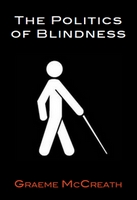 In his new groundbreaking book, The Politics of Blindness: from Charity to Parity, author Graeme McCreath does what no other person in the history of our country has done; he writes expertly and profoundly about the deplorable situation faced by blind Canadians, and brings our voices to life.
In his new groundbreaking book, The Politics of Blindness: from Charity to Parity, author Graeme McCreath does what no other person in the history of our country has done; he writes expertly and profoundly about the deplorable situation faced by blind Canadians, and brings our voices to life.
With great care, respect and honesty, Mr. McCreath documents the complicated and systemic issues affecting the lives of blind people in Canada. He reviews the social factors underlying the current situation, describes how our history brought us to where we are today and clearly outlines positive and proactive solutions for change.
After reading his book, we can no longer stand aside, turn away and ignore the existence of this far-reaching and terrible problem in our society.
Mr. McCreath explains how we arrived at the present situation of a 75 per cent unemployment rate for blind Canadians, a staggeringly high level of poverty, a severe shortage of proper education and training for blind individuals and a disgraceful lack of knowledge or concern about the plight of blind Canadians on the part of government, the public, and organizations that are supposed to help blind people.
Mr. McCreath’s book brings clarity to the struggles of blind people in this country and describes the obstacles that plague their journey to dignity and equality.
“The Politics of Blindness” stands as a monument of history, a testament to the unrecognized blind citizens of our country and a guide to motivate positive change for blind Canadians now and in the future.
I am grateful to Mr. McCreath for his commitment, for his perseverance and for his courage in writing this book. I implore all who read it to take steps to make sure this shameful situation does not continue in our country. As Mr. McCreath says in the final pages of his book, “Let’s make it r.e.a.l.” Blind Canadians must achieve respect, Equality, assimilation /integration into society, and liberty. Only with these achievements can we hope to attain first class citizenship and equal status with the sighted.
With heartfelt thanks,
Elizabeth Lalonde, President
Canadian Federation of the Blind

Caught your program on CBC Radio (96.5) on March 16 which my wife and I found to be of great personal interest. Her brother, now 70, living in Scotland went through the whole system. Royal Blind School in Edinburgh “graduated” to the Royal Blind Workshop where he toiled until retirement, Going out to puchase Mr McCreath’s book. Do you know if it is available in Scotland ? Home phone 613-933-1264. 540 Hillcrest Av, Cornwall, ON K6H 2P7
I listened with great interest and concern to an interview of Graeme McCreath on CBC Radio 91.7 FM March 16. We have a family friend who has overcome the great obstacle of being born blind. He has completed university and theological studies and is active as a musician and gospel singer. Although independence and rewarding careers have been achieved, Graeme McCreath’s book and efforts are important to create awareness of the plight of the majority of those with sight impairment. Certainly the Canadian federal and provincial governments should be providing educational opportunity for the blind instead of passing their responsibility to the CNIB.
I listened to Mr. McCreath’s interview; what disturbed me most was when I went to search for his book on the CNIB library website, it was not available (how interesting…)
I look forwerd to reading mr. McCreath’s book. I to found his interview on the cbc verry interesting. I agree with his views on cnib and how it needs to be dismantled. I thought that it was interesting that they played tape of John Rafferdy responding to mr. McCreath’s commints. now what I would like to see is the 2 of them in the same room together wile a radio station like cbc brodcasts there views to blind people kind of like what they did on the sunday eddition back in the summer when they had mr. rafferdy and 2 other people talk about Braille.
My blind friend, who has devoted decades to helping other blind people through CNIB, called that organization asking them to send someone out to help him fill in the government census form. He was told “We don’t do that”.
I am appalled.